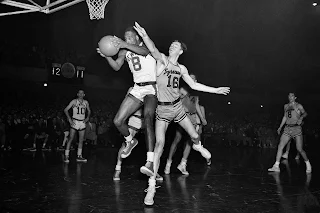How do you prefer your Game 7 served up?
The recently concluded NBA Playoffs mark the 20th season since the Association last adjusted the format of its title-determining “tournament,” expanding the first round’s best-of-five scheduling to a full seven games … putting in place the now two-month post-season smorgasbord we’ve all come to know and love (?). Twenty seasons and 300 best-of-seven match-ups have produced what are often called the “sweetest words to a fan’s ear” on 63 occasions. So, about three series per year these days extend to a “do or die” Game 7 … roughly one out of every five (21%).
A by-then 14-team NBA wrapped up its 23rd season – not to mention the playing career of the great Bill Russell – on the night of Monday, May 9, 1969, with a championship-determining Game 7 in Los Angeles.
The Association was staging just its 20th Seventh Game ever, exactly half of which were won by a Russell-led squad of Celtics. This occasion would mark Bill’s fourth Game Seven Showdown with Wilt Chamberlain … the Celtics ended up winning those four games by a combined NINE points. [Indeed, only two of Boston’s 10 Game 7 triumphs had been by more than five points – and included two of the mere seven that have ever required extended play to decide a winner.]
While a best-of-seven series has been used to crown all 76 titlists, those in charge were rather stingy in the extent of its usage during the formative years (fewer than 40 such confrontations through the NBA/BAA’s first 20 years).
The league’s very first Game 7 arose in Year 2, pitting the Western Division champion St. Louis Bombers (the only defunct franchise ever to have competed in a seventh game) and the Philadelphia Warriors (the East’s top finishers and defending league champs). “Jumpin’ Joe” Fulks and his Warriors finished off a back-and-forth series with an 85-46 road waxing of the Bombers, the second-largest Game 7 margin of victory in league history. [It would take 20 years, however, before another home team would be defeated in a seventh game, BTW.]
 |
| "Sweetwater" |
Despite more than a decade of desolation – the Knicks failed to win a single playoff GAME between March 16, 1955 (102-95 over Red’s Celtics, ironically) and March 26, 1967 (123-112 over rookie Coach Russell & Co.) – New York is one of just three franchises to have won TWO Game 7’s in the same playoff run (1970) during the Association’s first four decades, Boston (1962, 1984) and Baltimore (1971) being the others. [The Showtime Lakers needed THREE successful Game 7’s to secure the ’88 banner, while the ’94 Knicks who came up just short against Olajuwon’s Rockets are the only other squad to have faced three seventh games.]
 |
| Just babies, huh? |
All 30 current franchises have partaken of at least one do-or-die Game 7 – indeed Charlotte is the only organization never to have hosted one and at 0-2 are one of only three teams to never have won a seventh game, New Orleans (0-2) and Memphis (0-3) the others. [You’ll never guess the only team that has yet to LOSE a Game 7 in its more than three decades of existence!]
Perhaps fittingly, about one of every seven (22 out of 144) Game 7’s have been decided by one or two points – relatively close to the number of games (29) that were “blow-outs” (16+ margin of victory). In exactly three out of every eight (54 out of 144), the Margin of Victory was five points of fewer. Here’s a more thorough breakdown of the competitive level of “Games 7” thru the years:
1-point MOV: 8 times [’03-’22 – 1 time]
2-point MOV: 14 times [’03-’22 – 4 times]
3-point MOV: 8 times [’03-’22 – 1 time]
4-point MOV: 15 times [’03-’22 – 8 times]
5-point MOV: 9 times [’03-’22 – 4 times]
6 – 10 pt. MOV: 36 times [’03-’22 – 16 times]
11 – 15 pt. MOV: 25 times [’03-’22 – 12 times]
16 – 20 pt. MOV: 13 times [’03-’22 – 5 times]
21 – 25 pt. MOV: 5 times [’03-’22 – 4 times]
26 – 30 pt. MOV: 4 times [’03-’22 – 3 times]
31+ pt. MOV: 7 times [’03-’22 – 5 times]
That second set of numbers seems to suggest a slackening (?) in the competitive level of these “ultimate” games – fewer than one out of every 10 games (6 out of 63) decided by one possession.
Well, at least the Knicks can hold up their heads, it ain’t their fault – they’re the only NBA team not to have played a Game 7 since that ’03 format change.
 |
| Future Knick coach |
Abacus Revelation for the Road
For those still wondering, the only NBA team never to have lost a Game 7 are the Minnesota Timberwolves, who knocked off Sacramento at home in the West Semis back in 2004 and have yet to play another.
One more “incidentally” for ya – a reliable rotation player on that 1951 Rochester Royals squad who denied the Knicks their “miracle” comeback was none-other-than the man who would later coach them to the only two championships in franchise history.







 alt="" data-uk-cover="" />
alt="" data-uk-cover="" />















